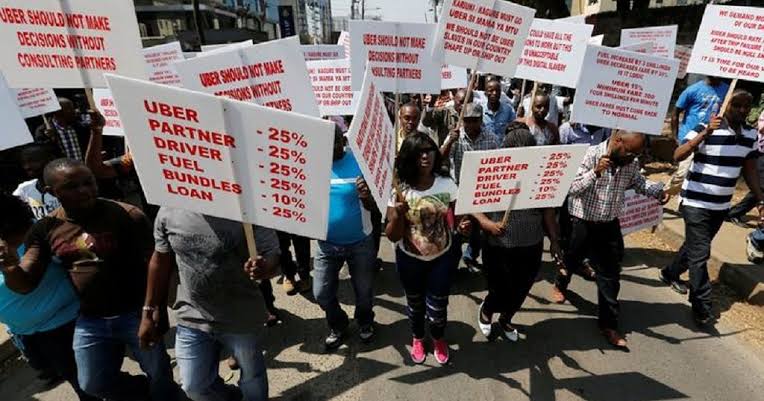Physical Address
60 Ekwema Cres, Layout 460281, Imo
Physical Address
60 Ekwema Cres, Layout 460281, Imo

In recent weeks, Kenyan drivers have found themselves embroiled in a heated dispute with ride-hailing apps over fare rates and working conditions.
As these ride-hailing companies continue to expand their operations in Kenya, drivers are increasingly voicing their concerns regarding the sustainability of their earnings and the fairness of the rates set by these platforms.
This ongoing battle highlights the growing tension between drivers seeking better compensation and the ride-hailing companies aiming to maintain competitive pricing in a rapidly evolving market.
The point of the issue lies in the drivers’ demand for higher fares. Many drivers argue that the current rates set by ride-hailing apps do not adequately reflect the rising costs of living and operating expenses.
Fuel prices, maintenance costs, and other overheads have surged, prompting drivers to call for a reassessment of the fare structures.
In response to these challenges, drivers have organized protests and strikes, urging ride-hailing companies to engage in negotiations.

They contend that the fare rates have not been adjusted in line with inflation and the increased cost of living, which has significantly impacted their take-home pay.
The drivers emphasize that without a fair compensation structure, their livelihoods are at risk, as they struggle to make ends meet while working long hours.
On the other hand, ride-hailing companies maintain that the current fare structures are designed to remain competitive in a crowded market.
These companies argue that any increase in fares could lead to a decrease in demand for their services, ultimately harming both drivers and passengers.
They emphasize the importance of balancing profitability with affordability, claiming that their pricing models are reflective of market conditions and consumer behavior.
Moreover, ride-hailing apps have introduced various incentives and bonuses to attract drivers and retain their loyalty.
However, many drivers feel that these incentives are insufficient to address their core concerns about fare rates.
The companies assert that they are committed to working with drivers to find solutions, yet the ongoing tensions suggest that deeper issues remain unresolved.
The situation is further complicated by regulatory challenges. The Kenyan government has been urged to step in and establish a framework that ensures fair compensation for drivers while also considering the interests of ride-hailing companies.
There is a growing consensus among stakeholders that a regulatory body is needed to oversee fare structures and working conditions in the ride-hailing industry.
Some policymakers have proposed implementing minimum fare standards and transparency in pricing to protect drivers from exploitation.
However, the ride-hailing companies have expressed concerns that such regulations could stifle innovation and hinder their ability to operate effectively in the market.
Read Next: Uber Makes First African Investment in Mobility Fintech Startup, Moove
As the battle between Kenyan drivers and ride-hailing apps continues, the future of the industry hangs in the balance.
Drivers are increasingly vocal about their demands, and their collective actions are gaining traction.
The potential for a significant shift in the ride-hailing landscape is evident, as both drivers and companies must navigate the complexities of fair compensation, market competitiveness, and regulatory oversight.
The outcome of this conflict could set a precedent for the ride-hailing industry not only in Kenya but also in other markets across Africa.
As more drivers join the movement for better pay and working conditions, the pressure on ride-hailing companies to adapt their business models is likely to intensify.
The ongoing battle between Kenyan drivers and ride-hailing apps over fare rates underscores the challenges faced by workers in the gig economy.
As both sides seek to assert their interests, the resolution of this dispute will be crucial in shaping the future of ride-hailing services in Kenya.
With drivers demanding fair compensation and ride-hailing companies striving to maintain their market position, the next steps taken by both parties will be pivotal in determining the sustainability of this rapidly growing sector.
Was this information useful? Drop a nice comment below. You can also check out other useful contents by following us on X/Twitter @siliconafritech, Instagram @Siliconafricatech, or Facebook @SiliconAfrica.